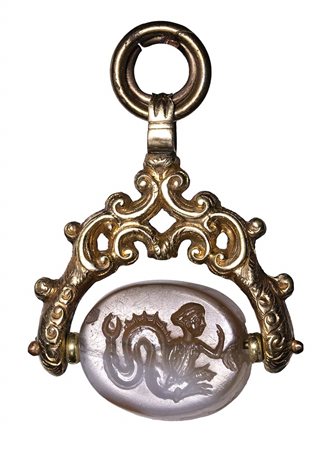 Bertolami Fine Art - Bertolami Fine Art, 1 Harewood Place 1, W1S 1BU Londra
Bertolami Fine Art - Bertolami Fine Art, 1 Harewood Place 1, W1S 1BU Londra
ASTA 107 - Glittica Sessione Unica
Friday 22 April 2022 hours 15:00 (UTC +00:00)
A greek classical banded agate scaraboid engraved seal set in a gold swivel mounting. Scylla. Second half of the 5th century B.C.
A greek classical banded agate scaraboid engraved seal set in a gold swivel mounting. Scylla.
Second half of the 5th century B.C.
Scylla, in profile to the left. She is human down to the waist, and than has the body and tail of a fish at the back, and the forepart of a dog in front. The human part is shown wearing a stylized sakkos and a chiton. Wear marks and chip on the edge. Beautiful honey tone of the banded agate, with a white part symbolizing the waves of the sea. The scarab is mounted in a swivel and chiseled collector's gold seal, dating from the 19th century. Rare. Parallel: G. M.A. Richter, Engraved gems of the greeks and etruscans. A history of greek art in miniature, n. 363- 364; AGDS, Berlin n. 157; J. Boardman, GGFR, n. 453; BNF database, Cabinet des Médailles, inv. Luynes.264: "Scylla à droite, coiffée d’un kécryphale, a le buste d'une femme couvert d’une courte tunique, un protomé de chien sous le ventre et une queue de poisson. Elle tend la main gauche en avant. Intaille en cristal de roche. vers 460 av JC. Chez Homère, Circé met Ulysse en garde contre la terrible aboyeuse, monstre aux douze pattes et six têtes de chien avec trois rangées de dents. Elle est traditionnellement décrite avec un torse de femme ceint de chiens aboyants, réduits ici, par les dimensions miniatures de l’œuvre, à une seule tête". See also the greek coinage for the pose of the left arm.
Stone 15x18x8 mm; High with seal 40 mm; 8,65 gr.
Provenance: english private collection S.B., London, acquired on the London art market in 1969.








